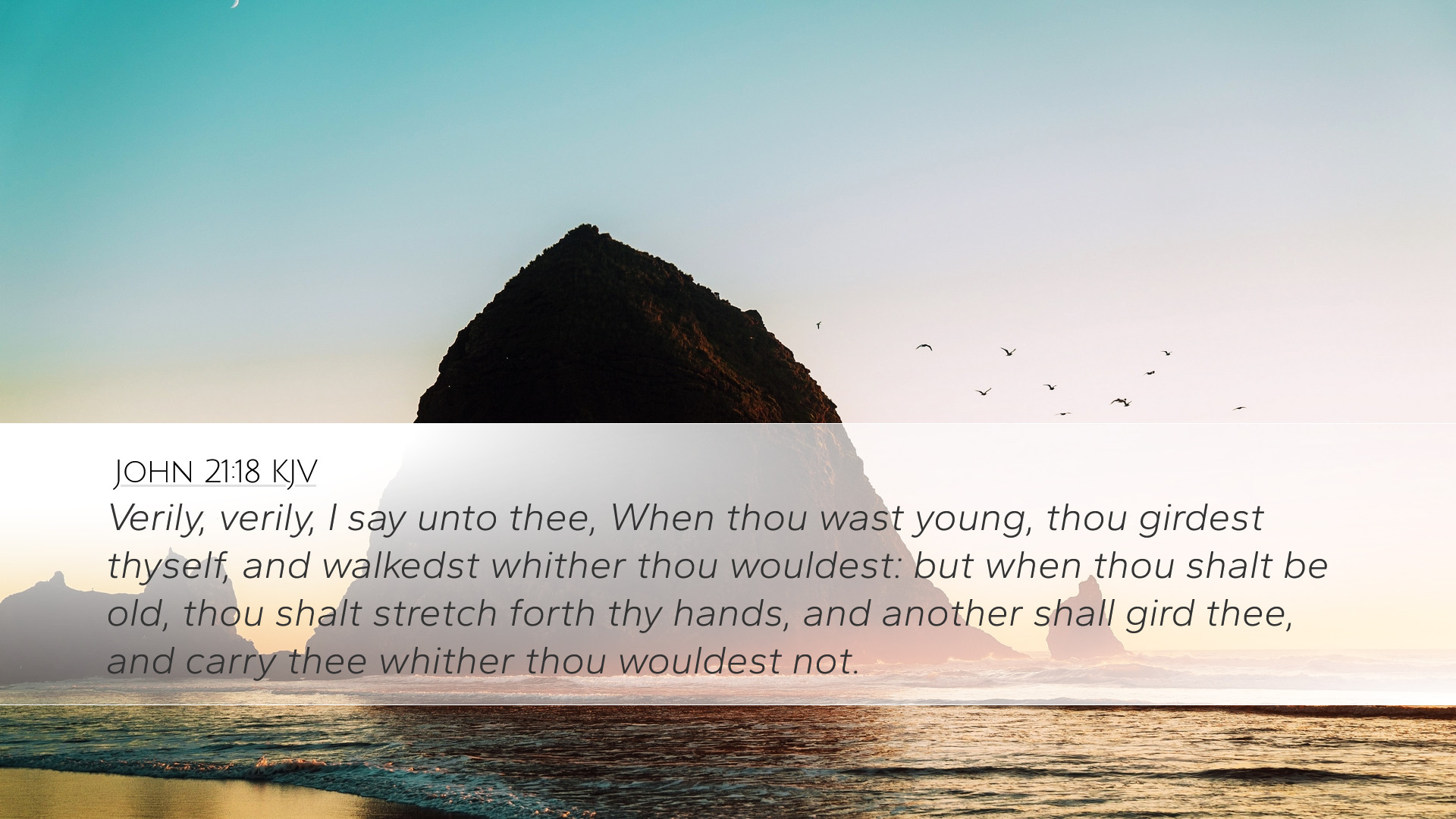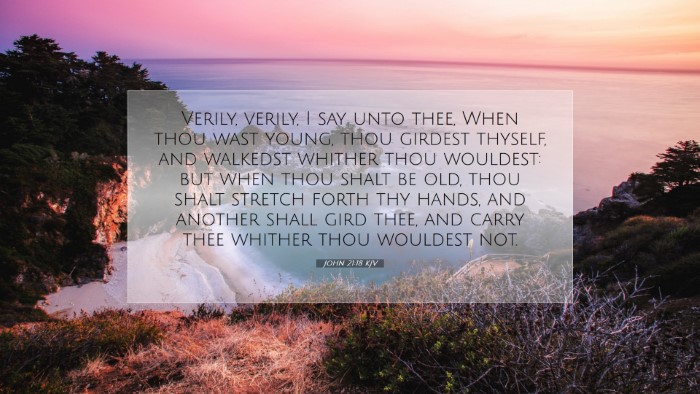Old Testament
Genesis Exodus Leviticus Numbers Deuteronomy Joshua Judges Ruth 1 Samuel 2 Samuel 1 Kings 2 Kings 1 Chronicles 2 Chronicles Ezra Nehemiah Esther Job Psalms Proverbs Ecclesiastes Song of Solomon Isaiah Jeremiah Lamentations Ezekiel Daniel Hosea Joel Amos Obadiah Jonah Micah Nahum Habakkuk Zephaniah Haggai Zechariah MalachiJohn 21:18
John 21:18 KJV
Verily, verily, I say unto thee, When thou wast young, thou girdest thyself, and walkedst whither thou wouldest: but when thou shalt be old, thou shalt stretch forth thy hands, and another shall gird thee, and carry thee whither thou wouldest not.
John 21:18 Bible Commentary
Commentary on John 21:18
John 21:18 states: "Verily, verily, I say unto thee, When thou wast young, thou girdedst thyself, and walkedst whither thou wouldest: but when thou shalt be old, thou shalt stretch forth thy hands, and another shall gird thee, and carry thee whither thou wouldest not."
Introduction
This verse concludes the restoration of Peter by the resurrected Christ, serving as a poignant reminder of the cost of discipleship and the nature of following Christ. The passage invites deep theological reflection on themes of maturity, sacrifice, and divine calling.
Exegesis and Theological Insights
The verse uses the metaphor of girding oneself, contrasting the freedom of youth with the constraints of age. Each element of this verse serves to illustrate Peter’s future martyrdom and the transition from self-direction to submission to God’s will.
Matthew Henry's Commentary
Matthew Henry emphasizes the significance of the phrase "When thou wast young." He points out that this indicates a time of autonomy and self-sufficiency. In contrast, the latter part of the verse provides a prophetic insight into the future sufferings and eventual martyrdom of Peter. Henry asserts that in stretching forth his hands, Peter symbolizes his willingness to suffer for Christ, which he would ultimately do through crucifixion.
Albert Barnes' Notes on the New Testament
Albert Barnes highlights that the term "girded" refers to preparation for labor or activity, suggesting that Peter’s early ministry was characterized by personal initiative. He notes the significant transition described in the latter half of the verse, where Peter will be constrained by circumstances beyond his control, indicating a divine plan at work. Barnes interprets this as a metaphor for the obedience and submission that would define Peter's eventual ministry, which culminated in martyrdom.
Adam Clarke's Commentary
Adam Clarke provides a deeper examination of the symbolism in this verse, suggesting that it illustrates the transformation of character that faith brings. Clarke notes that "another shall gird thee" signifies that Peter’s life will no longer be his own; he will be led by divine purpose even into suffering. This future constraint foreshadows the trials he will face, aligning with Jesus’ call to discipleship involving both sacrifice and humility.
Theological Themes
- Discipleship and Sacrifice: The call to discipleship is not without cost. The implications of being 'girded and carried' speak to the surrender of personal desires in favor of God’s plan.
- Spiritual Maturity: The transition from youth to old age symbolizes spiritual growth. As one matures in faith, there is a greater understanding of the necessity of submitting to God's will.
- Prophetic Insight: This verse serves as a prophetic word regarding Peter's fate and underscores the authenticity of Christ's foresight. It emphasizes the importance of recognizing God’s sovereignty over our lives.
Application for Pastors and Theologians
For pastors, the insights from John 21:18 present a compelling model for preaching on the nature of true discipleship. The idea that following Christ will lead to paths of suffering and service should be woven into messages on the Christian life.
Theological reflection can also emerge from this verse as it calls into question what it means to grow in faith. This passage can encourage theological reflection on the nature of God’s nurturing hand throughout the life of a believer.
Conclusion
In conclusion, John 21:18 is not merely a personal message to Peter but resonates with every believer. Through the layers of meaning presented in the commentaries of Matthew Henry, Albert Barnes, and Adam Clarke, this verse challenges each individual to consider the implications of their commitment to Christ.


